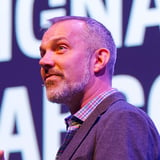Log in or create a free Rosenverse account to watch this video.
Log in Create free account100s of community videos are available to free members. Conference talks are generally available to Gold members.
Summary
DesignOps as a practice is still relatively new—but the activities have been around long enough that we’re increasingly challenged to justify and quantify what we do. Accordingly, we need to address not just what is DesignOps, but how do we prove its value? What outcomes can we genuinely promise? And how do we know we are successful? In this webinar, we identify techniques, tactics, and tools for proving (and even measuring) value, and describing the outcomes that matter most.
Key Insights
-
•
62% of design ops professionals are unsure how to measure the value of their work or have not figured it out yet.
-
•
Design ops teams typically spend about 60% of their time on coordinating work rather than direct impact activities.
-
•
Spotify organizes design ops work around three pillars: learning and inspiration, community culture, and tools/systems.
-
•
Measurement frameworks must be flexible and adapt depending on an organization's design ops maturity stage.
-
•
Designer productivity measurement focuses on identifying bottlenecks in workflows rather than just accelerating speed.
-
•
There is often resistance from designers to processes intended to streamline work, posing a challenge for design ops.
-
•
Attribution of design ops outcomes is difficult due to long and variable product release cycles.
-
•
Partnering with analytics and data science teams is essential to effectively measure design ops impact.
-
•
Design systems measurement commonly starts with adoption rates and usage metrics but is difficult to fully quantify.
-
•
Remote work and current global challenges have complicated measuring designer happiness and productivity, emphasizing empathy.
Notable Quotes
"People spend about 60% of their time on the work about the work."
"Only one in 10 companies have quantifiable measurement for their design leaders."
"Measurement is not just about tools but about an intentional strategy with a flexible framework."
"In many cases, we don’t even know what the work is in design ops."
"It’s far more helpful to focus on removing bottlenecks and friction points in designers’ workflows than just trying to make them work faster."
"Designers often resist processes meant to streamline their work because it feels restrictive."
"There’s not yet an industry standard for measuring the impact of design ops."
"Shared outcomes and shared goals are critical to any measurement initiative."
"Attribution is tricky because design work’s impact often occurs six months or a year after the work is done."
"Empathy is essential now more than ever in measuring and supporting designer happiness during remote work."
Or choose a question:
















More Videos

"If we do things with the least amount of friction, resiliency isn’t the problem anymore, efficiency is."
Dave MaloufTheme 3: Introduction and Provocation
January 8, 2024

"VPs want to know what you really think. They want to see your insights distilled into a clear position of what needs to be done next."
Dalia El-ShimySo You've Got a Seat at the Table. Now What?
March 31, 2020

"People form habits on software that become efficient, so they naturally resist changes that force new habits."
Paula BachImproving Legacy Software: How Much Better Does it Have to Be?
March 11, 2022

"Mastercard designers grew meaningfully for both people and business despite uncertainty."
Lada GorlenkoTheme 2 Intro
June 9, 2022

"Meaningfulness is linked directly to what your organization cares about in terms of goals and priorities."
Landon BarnesAre My Research Findings Actually Meaningful?
March 10, 2022

"The enterprise feels like this immovable thing, but just like neuroplasticity shows brains can change, enterprises can get better too."
Susan WeinschenkEvaluating the Maturity of UX in Your Organization
January 15, 2020

"Who needs a designer when we have generative AI?"
Jon FukudaTheme One Intro
October 2, 2023

"Making accessible products helps fulfill our corporate mission of improving the life of every person on this planet."
Saara Kamppari-MillerTheme Three Intro
October 4, 2023

"Enterprise UX is about delivering strong experiences in an enterprise setting, which ain’t easy."
Louis RosenfeldWelcome / Housekeeping
June 6, 2023

















